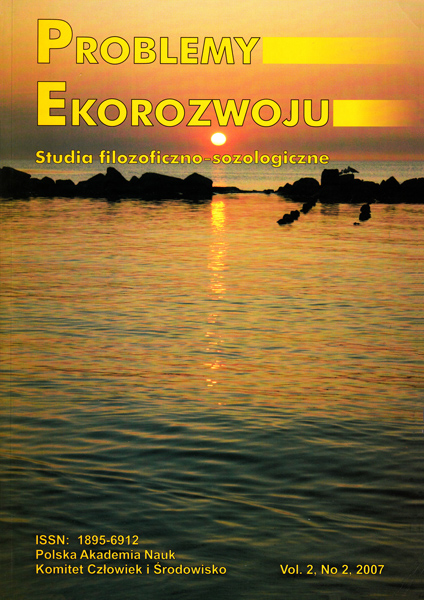Sustainable Development and Medial Society
Article Sidebar
Issue Vol. 2 No. 2 (2007)
-
From the Editorial Board
Artur Pawłowski3
-
Balancing the Order of the Human World: Natural and Socio-historical Conditions
Zdzisława Piątek5-18
-
Sustainable Development in the Context of Our Philosophy of History
Leszek Gawor19-25
-
The Philosophy of Sustainable Development as a Subdiscipline of Philosophical Research
Andrzej Papuziński27-40
-
Various Systems of Values in Sustainable Development
Józef M. Dołęga41-49
-
The Scientific Worldview or a Cognitive Illusion?
Barbara Krygier51-58
-
Anticipation of the Idea of Sustainable Development According to Aurelio Peccei’s Concept of New Humanism
Helena Ciążela59-67
-
About Violent Sustainable Development
Stefan Symotiuk64-74
-
Catastrophe or Life – Contemporary Threats to Humankind and Earth
Anna Żuk75-84
-
Sustainable Development and Medial Society
Ignacy S. Fiut85-93
-
The Internet as a Tool for Building Awareness for Sustainable Development
Aleksandra Kuzior95-101
-
Concepts of Sustainable Development in Holistic Nature Studies
Jan Sandner103-107
-
Book Review: Marek M. Bonenberg: Tesknota za Olduvai. Artykuły i eseje ekofilozoficzne, Kraków 2006
Ignacy S. Fiut109-111
Archives
-
Vol. 6 No. 2
2011-07-01 19
-
Vol. 6 No. 1
2011-01-03 18
-
Vol. 4 No. 2
2009-07-01 19
-
Vol. 4 No. 1
2009-01-05 22
-
Vol. 3 No. 2
2008-07-01 19
-
Vol. 3 No. 1
2008-01-02 12
-
Vol. 2 No. 2
2007-07-02 13
-
Vol. 2 No. 1
2007-01-02 11
-
Vol. 1 No. 2
2006-07-03 15
-
Vol. 1 No. 1
2006-01-02 8
Main Article Content
Authors
Abstract
The paper argues that the developing medial society will support the balancing model of sustained development, selected out of several other solutions. Various categories of this development will be discussed, as presented in the literature on the subject, as will the relationship between sustainable development and the concept of collective welfare, defined in game theory terms, characteristic for the contemporary citizen society subject to globalization processes. Globalization transforms the society into the postindustrial one, in which the growing influence of the media on society of interactions with social and the natural environment plays a major role in the organization of the collective life. It is this which allows inter-human communication on an unprecedented scale, as well as communication with the environment. Neo-liberal theories describing the collective life of people have resulted in a crisis in the public media. Yet, their further development constitutes the condition of actualizing the idea of sustainable development. Media turns out to be indispensable for the realization of a balancing model. This problem will also be discussed in this paper. The author considers the balancing influence of sustainable development within the space of developing medial society as the real path towards the building of ecological order within the framework of social order.
Keywords:
References
BARD A., SöDERQVIST J., Netokracja. Nowa elita władzy i życie po kapitalizmie, Wydawnictwa Akademickie i Profesjonalne, Warszawa 2006.
BENKLER Y., The Wealth of Networks: How Social Production Transforms Markets and Freedom, Yale University Press, Haven and London 2006.
BORYS T., Wąskie i szerokie interpretacje zrównoważonego rozwoju oraz konsekwencje wyboru, w: Zrównoważony rozwój. Od utopii do praw człowieka, red. Papuziński A., Oficyna Wydawnicza Branta, Bydgoszcz 2005.
CORNES R, SANDLER T., The Theory of Externalities, Public Goods and Club Goods, Cambridge Unity Press, Cambridge 1996.
CUBITT S., The Triumph and Demise of the Global Audience, „Art Inquiry” 2002, vol. IV (XIII).
DeKERCKHOVE D., Powłoka kultury. Odkrywanie nowej elektronicznej rzeczywistości. Mikom, Warszawa 1996.
DYSON G. B., Darwin wśród maszyn. O ewolucji inteligencji, Pruszyński i S-ka, Poznań 2006.
FIUT I. S., W stronę społeczeństwa medialnego, w: Społeczeństwo informacyjne. Aspekty funkcjonalne i dysfunkcjonalne, red. Haber L. H., Niezgoda M., Wydawnictw Uniwersytetu Jagiellońskiego, Kraków 2006.
FIUT I. S., Media@Internet. Szkice filozoficzno-medioznawcze z lat 2000-2006. STAL, Kraków 2006.
FIUT I. S., 2006, Zrównoważony rozwój: aspekt filozoficzny i medialny, w: Problemy Ekorozwoju. Studia Filozoficzno-sozologiczne, vol. 1, No 2.
GRAHAM A, DAVIES G., Brodcasting, Society, and Policy In the Multimedia Age, University of Luton Press, Londyn 1997.
GOBAN-KLAS T, Media i komunikowanie masowe. Teorie i analizy prasy, radia, telewizji i Internetu, Wydawnictwo Naukowe PWN, Warszawa 2004.
JAKUBOWICZ K., Media publiczne. Początek końca czy nowy początek, Wydawnictwo Akademickie i Profesjonalne, Warszawa 2007.
LEVINSON P., Telefon komórkowy. Jak zmienił świat najbardziej mobilny ze środków komunikacji, Wydawnictwo Literackie MUZA, Warszawa 2006.
LéVY P., Collective Intelligenc: Mankinds Emerging World Cyberspace, Perseas Books, Cambridge 1997.
MARSHALL Th. H., Citizenship and Social Class, Cambridge Unity Press, Cambridge 1950.
McLUHAN M., Zrozumieć media. Przedłużenia człowieka, Wydawnictwa Naukowo-Techniczne, Warszawa 2004.
MISHAN E. J., Spór o wzrost gospodarczy, PIW, Warszawa 1986.
OSTROM E., Govering the Commons: The Evolution of Institutions for Collective Action, Cambridge University Press, New York 1990.
OSTROM E., WALKER J., GARDNER G., 1992, Covenants without a sword: self-governance is possible, w: American Political Science Review.
RIDLEY M., O pochodzeniu cnoty, Dom Wydawniczy REBIS, Poznań 2000.
SAMUELSON P.A., 1954, The Pure Theory of Public Expenditure, w: Review of Economics and Statistics.
SAMUELSON P. A., NORDHAUS W.D., Ekonomia, PWN, Warszawa 1986.
Article Details
Abstract views: 83
License

This work is licensed under a Creative Commons Attribution-ShareAlike 4.0 International License.


